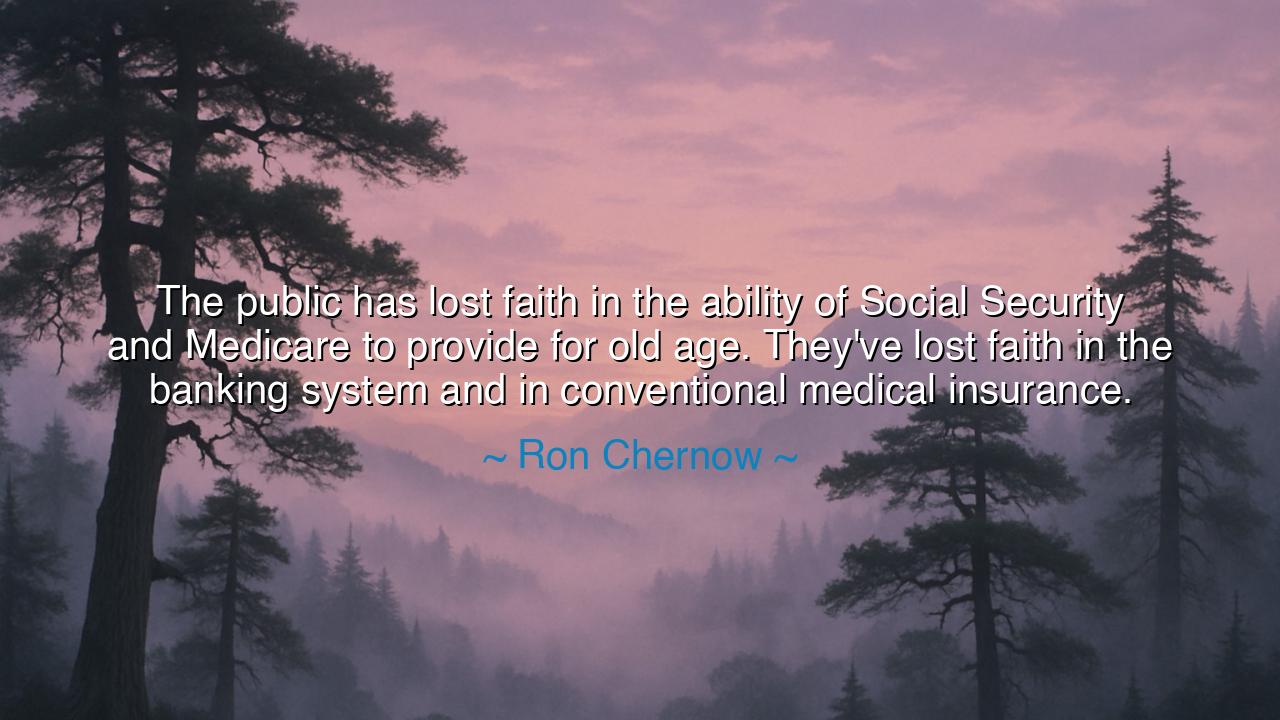
The public has lost faith in the ability of Social Security and
The public has lost faith in the ability of Social Security and Medicare to provide for old age. They've lost faith in the banking system and in conventional medical insurance.






"The public has lost faith in the ability of Social Security and Medicare to provide for old age. They've lost faith in the banking system and in conventional medical insurance." – Ron Chernow
In the labyrinth of modern society, there are few things more sacred than the sense of security we feel about our future. For generations, Social Security, Medicare, and the banking system were pillars of that security—systems built to protect us in our later years, to provide for our health, and to safeguard our wealth. Yet, as Ron Chernow so poignantly observes, the public has lost faith in these very institutions. They are no longer seen as the unwavering safeguards they once were, but as systems that have failed to uphold the promises they made. This distrust—whether in our government, our financial systems, or our healthcare—is a powerful force that shapes the modern world, leaving individuals to grapple with a future that feels increasingly uncertain.
This loss of faith in established systems is not a new phenomenon. In ancient Rome, the people too experienced a collapse of trust in the very institutions meant to provide stability. The Roman Empire, once a beacon of military might and social order, saw the erosion of its republican ideals as power became concentrated in the hands of the few. As the empire grew, the common citizen could no longer rely on the state to deliver justice or protection, and the promise of public welfare dissolved into corruption. The disillusionment of the Roman plebeians mirrors the modern sense of betrayal felt by citizens today, who see their public institutions crumbling under the weight of inefficiency and greed.
In our modern age, the banking system stands as a prime example of this broken trust. The 2008 financial crisis revealed the fragility of the global financial system, as banks, once considered the bedrock of economic stability, collapsed under the weight of reckless speculation. It was a shocking moment for many, as ordinary citizens saw their life savings evaporate, their homes foreclosed upon, and their futures thrown into jeopardy. In the wake of the crisis, trust in the banks and financial institutions was shattered, leading to widespread cynicism and a deep distrust in the very system that was meant to uphold the financial health of the nation.
The same sense of betrayal has crept into the realm of healthcare. When Medicare and Social Security were first established, they were heralded as revolutionary steps towards ensuring that every citizen could age with dignity and without fear of financial ruin. Yet today, many view these programs as insufficient, unable to provide for the elderly in a way that reflects the growing cost of living and the rising healthcare expenses. The fragility of these systems—struggling with debt, political gridlock, and underfunding—has led many to question their long-term viability, just as the Romans once questioned the stability of their own systems of governance and welfare.
The disillusionment we face today is not merely a product of economic hardship, but also a crisis of faith in the very institutions that were created to safeguard us. Mahatma Gandhi, in his quest for independence and justice, spoke of the necessity of self-reliance—a notion that in times of unrest and uncertainty, we must turn inward, relying on our own strength and wisdom rather than on systems that may fail us. Like the ancient philosophers who urged individuals to cultivate virtue and independence in the face of external turmoil, Gandhi’s words remind us that we must not place our faith entirely in institutions, but also in the resilience and strength of the human spirit.
In the face of this disillusionment, the lesson is one of self-empowerment and critical engagement. To reclaim faith in our systems, we must first engage with them critically, demanding transparency, accountability, and efficiency from the institutions we rely on. We must also take responsibility for our own futures, investing in our health, education, and financial security, rather than relying solely on external systems to provide for us. Just as the ancient Stoics taught that true peace comes from within, so too must we find ways to fortify ourselves in a world where external systems may falter.
In practical terms, we must invest in ourselves—through education, savings, and healthcare, ensuring that we are not solely dependent on systems that may not have our best interests at heart. Diversifying our resources, whether through investments or personal growth, is essential for ensuring that we are prepared for a future that may not unfold as we expect. Just as the wise Herodotus warned of the fragility of great civilizations, we must understand the fragility of our own systems and take proactive steps to secure our future, finding strength not in blind trust, but in thoughtful preparation and self-reliance.






AAdministratorAdministrator
Welcome, honored guests. Please leave a comment, we will respond soon